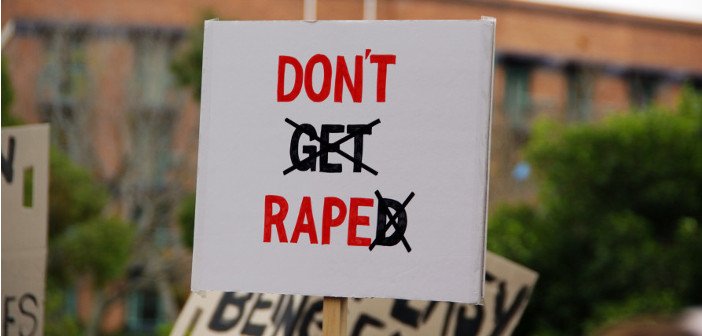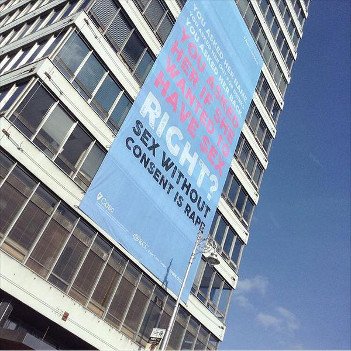Consent isn’t just Sexy, it’s a Necessity
The past few weeks have seen timelines and trending topics abuzz with #Repealthe8th, as many vie to overturn the legislation that denies Irish women basic human rights – the right to their own choices about their own bodies. The 8th Amendment of the Constitution Act 1983 was fully outlined in layman’s terms back in August 2014 by thejournal.ie. The article resulted from the case of a rape victim who was refused an abortion, and instead forced to have a Cesarean. Fast forward to September 18th 2015, when the Ask Consent campaign was launched by the Dublin Rape Crisis Centre (DRCC) in an effort to educate the Irish public on the issue of sexual consent. But how are the two linked, you may ask?
Well, in light of the Repeal the 8th campaign, one must look at the circumstances under which a woman might need an abortion. Accidental or unwanted pregnancies are quite common. There are multiple situations in which a woman can experience contraceptive failure; particularly in the case of the contraceptive pill which can even be affected by the consumption of alcohol. A woman may be taking medication for mental or physical illnesses which can have immeasurable negative effects on the development of a foetus (even taking something as simple as antibiotics can cause birth defects). A woman may not be in a financial position to raise a child, and may want to establish a career and have a good income before having a family. A woman may not be prepared to be a single parent if she was not in a relationship at the time of conception – or found herself alone after the pregnancy was discovered. What it all boils down to is, no matter the reason for the pregnancy, a woman should be able to have the choice to do whatever she wants with her own body. It belongs to her, and her alone. However, the biggest cause of concern over the necessity of abortion is the possibility of pregnancy through rape.
Ann Marie Gill, the chairperson of the board in the 2014 DRCC Annual Report says that
Sexual assault elicits outrage, not only because of the immediate physical violation but the violation which goes beyond the assault. The trauma lies in the crime as committed and in its aftermath, and in the consequences for the victim which can be long lasting and life diminishing.
 However, the understanding of what rape and sexual assault actually is seems to elude a lot of individuals, thus proving the necessity of the Ask Consent campaign. The inability to discern the difference between sexual assault, sexual aggression and rape is almost terrifying, as many young males – and young females – don’t understand the mere definition of sexual assault. The Criminal Law (Rape) (Amendment) Act, 1990 states that the “offence of indecent assault upon any male person and (…) any female person shall be known as sexual assault.” This includes inappropriate touching, sexual aggression (which can include threats of violence but doesn’t necessarily mean that violence occurred) and rape. Roughly translated, the Act means that touching someone inappropriately, or forcing yourself on someone, is illegal and can result in jail time.
However, the understanding of what rape and sexual assault actually is seems to elude a lot of individuals, thus proving the necessity of the Ask Consent campaign. The inability to discern the difference between sexual assault, sexual aggression and rape is almost terrifying, as many young males – and young females – don’t understand the mere definition of sexual assault. The Criminal Law (Rape) (Amendment) Act, 1990 states that the “offence of indecent assault upon any male person and (…) any female person shall be known as sexual assault.” This includes inappropriate touching, sexual aggression (which can include threats of violence but doesn’t necessarily mean that violence occurred) and rape. Roughly translated, the Act means that touching someone inappropriately, or forcing yourself on someone, is illegal and can result in jail time.
Sadly, the Ask Consent campaign is shockingly necessary. It upsets me to think that in 2015, a campaign has to be launched to encourage people to actually ask their respective partners for sexual consent. I’m sure that anyone who has dared to read the comments on any Facebook posts about the topic will have seen disgusting exclamations of incredulity (unfortunately usually by males, although this article is not intended to place blame on members of any gender or orientation). One guy – and for the sake of journalism I will not go and retrieve said comment as I would have to ask his permission and would probably frisbee a book at his face simultaneously – said that he had never, in all his years of bringing girls home, asked a girl if she wanted to have sex with him, as surely simply agreeing to go home with him would be indicative of the fact that she wants to have sex with him anyway.

Unfortunately, this is a reality for a lot of people. They agree to go home with a person and then find themselves in a position they don’t want to be in. The journal.ie reported that 16% of surveyed students had experienced some form of unwanted sexual attention or assault while studying at third level. Ask anyone, and I’m sure they can offer an unpleasant anecdote about another young person completely misunderstanding the necessity of asking consent. Indeed, this time last year myself and a friend were in a bar, when a guy approached us out of the blue, sat down and said “So what’s your opinion on feminism? ‘Cause I don’t think rape exists; girls these days can just fight rapists off.” That is 100% a true story… And I’ll bet that there are countless others like it.
The UCLA Rape Treatment Centre cites that rape victims often feel ashamed – both of the rape and of allowing themselves to be in a position where they could be raped, as in some cases rape victims felt as though they couldn’t say no, or that they were unable to stop proceedings once sex had been initiated. The Ask Consent campaign applies to everyone – both males and females – and benefits everyone. It educates everyone. It is not hard to ask a person if they are okay with where things are going, or if they want to continue, to ensure that any ensuing sexual encounter is mutual and consensual. A quick scan of the #AskConsent tag on Twitter shows the high levels of support the campaign has had across the board.
So, to return to the 8th Amendment. Currently, the Protection of Life During Pregnancy Act offers the typical Irish woman a lot of distress. A person in the midst of a crisis pregnancy does not need panels of doctors, psychiatrists, and psychologists collectively deciding if said woman really needs an abortion. In essence, a woman who has been potentially raped is forced to go before a medical jury who elect whether or not she is fit to carry a baby.
[pullquote]A person in the midst of a crisis pregnancy does not need panels of doctors, psychiatrists, and psychologists collectively deciding if said woman really needs an abortion.[/pullquote]
This is not good enough.
Both #Repealthe8th and #AskConsent highlight an important anomaly in Irish legislation: that women are treated as second-class citizens with no rights or control over what happens to their bodies. Ask Consent aims to reclaim that control and assert that women (and indeed, men) are not sexual objects, and that mutual consent is mandatory. It’s about choice. A woman has the right to choose to have sex, and a right to choose whether or not having a baby is a good idea considering her personal situation.
It is time for the Irish government to listen to the cries of women sharing their abortion stories. It is time for the existence of the Ask Consent campaign to be linked to the need for an abortion referendum, so women can finally own themselves in their own country. It is time for the likes of Breda O’Brien to stop running their mouths off, and acting as if they are representative of every woman in Ireland. They are not. They never have been.
The cries of real, angry, Irish women are much stronger.
The voices of those ready for change are much, much louder.
Images via @dearyxuth
Damian O’Broin
thefreethoughtproject.com
